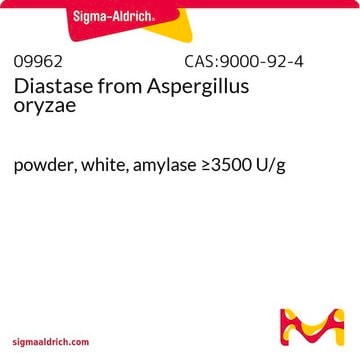10065
α-Amylase from Aspergillus oryzae
powder, ~30 U/mg
Synonym(s):
1,4-α-D-Glucan-glucanohydrolase
Sign Into View Organizational & Contract Pricing
All Photos(1)
About This Item
EC Number:
MDL number:
UNSPSC Code:
12352204
eCl@ss:
32160410
NACRES:
NA.54
Recommended Products
form
powder
specific activity
~30 U/mg
mol wt
Mr ~51000
storage temp.
2-8°C
Looking for similar products? Visit Product Comparison Guide
General description
Microbial amylases are exoenzymes and are used in several industrial applications, such as production of bread, maltose syrups, and fermentation of soya sauce, miso etc. α-Amylase isolated from Aspergillus oryzae has been found to have molecular weights of 51kDa (sedimentation and diffusion) and 49kDa (gel filtration).
Application
α-Amylase has been used:
- as a control enzyme in agar plate-based and carboxymethylcellulose-based clearing assays to screen cellulase activity
- for the hydrolysis of starch to explore the the role of wheat starch in frozen dough
- to inhibit Staphylococcus aureus biofilms
Biochem/physiol Actions
Aspergillus oryzae α-amylase (Ao α-amylase) enzyme catalyzes the hydrolysis of the α-1,4 glycosidic bonds in soluble starches and related subsrates. These substrates are broken down to release short oligosaccharides and α-limit dextrins.
Unit Definition
1 U corresponds to the amount of enzyme which liberates 1 μmol maltose per minute at pH 6.0 and 25°C (starch acc. to Zulkowsky, Cat. No. 85642, as substrate).
Other Notes
View more information on enzymes for complex carbohydrate analysis at www.sigma-aldrich.com/enzymeexplorer
For the determination of fats in food; Application in (selective) hydrolysis/condensation of glycosidic bonds.
Signal Word
Danger
Hazard Statements
Precautionary Statements
Hazard Classifications
Acute Tox. 4 Oral - Resp. Sens. 1
Storage Class Code
11 - Combustible Solids
WGK
WGK 3
Flash Point(F)
Not applicable
Flash Point(C)
Not applicable
Personal Protective Equipment
dust mask type N95 (US), Eyeshields, Gloves
Certificates of Analysis (COA)
Search for Certificates of Analysis (COA) by entering the products Lot/Batch Number. Lot and Batch Numbers can be found on a product’s label following the words ‘Lot’ or ‘Batch’.
Already Own This Product?
Find documentation for the products that you have recently purchased in the Document Library.
Customers Also Viewed
Han Tao et al.
Food chemistry, 190, 588-593 (2015-07-28)
The wheat dough was subjected to freezing/thawing treatment for 0, 3, 7, and 10 cycles and fractionated into non-gluten proteins and starch. High-performance liquid chromatography revealed changes in molecular mass distribution occurred for the extracted non-gluten proteins. As for the
Han Tao et al.
Food chemistry, 265, 18-22 (2018-06-10)
Properties of starches isolated from soft and hard wheat dough after freezing/thawing (F/T) treatment were investigated. Significance of results was observed between isolated hard wheat starch (HWS) and soft wheat starch (SWS), but both cultivars showed an increase in the
Hanne R Johnsen et al.
International journal of molecular sciences, 15(1), 830-838 (2014-01-15)
Reliable, rapid and inexpensive detection of cellulolytic enzymes that can be used for a wide variety of biological and environmental samples are currently in high demand. Here, a new cellulase detection protocol is described that circumvents problems observed with popular
Jian Song et al.
ACS applied bio materials, 2(8), 3448-3457 (2019-08-19)
Solutions of manually purified gastric mucins have been shown to be promising lubricants for biomedical purposes, where they can efficiently reduce friction and wear. However, so far, such mucin solutions have been mostly tested in specific tribological settings, i.e., in
Takagi, T., et al.
The Enzymes, 5, 235- 271 (1971)
Our team of scientists has experience in all areas of research including Life Science, Material Science, Chemical Synthesis, Chromatography, Analytical and many others.
Contact Technical Service












